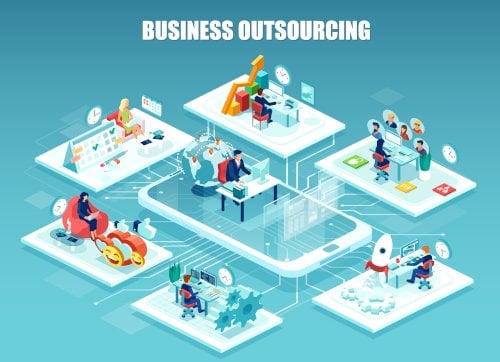What Is Business Process Outsourcing (BPO)?
Business Process Outsourcing is a practice of hiring external service providers by a business organisation to perform a specific set of tasks. In other words, Business Process Outsourcing is assigning business-related operations to a third-party vendor.
The foundation of Business Process Outsourcing lies in the following two pillars:
- BPO is Cost-Effective as it ensures reduced transaction costs
- BPO performs the given job better as professionals perform the tasks.
Business Process Outsourcing is also referred to as ‘IT-Enabled Services or ITES’.
What are BPOs used for?
BPOs create win-win situations by adding value to the business by achieving sustainable business process efficiency.
BPOs are used to achieve the following:
- Operational Efficiency by faster work turnaround and better productivity at a reduced cost.
- Reduced stake as fewer employees have to be recruited
- Opportunity to make a presence in a new market
- Building business value by focusing on core competencies.
Business Process Outsourcing is used to increase competitiveness through BPO.
How do BPO’s work?
BPOs offer plenty of services to fill gaps within a company. For hiring BPOs, you need to understand the following:
Step1: Understand your need to hire a professional service provider
First and foremost, the organisations evaluate the pros and cons of outsourcing work to a third-party vendor.
Would a business get the work done faster and better? Would a business save money by hiring a third-party vendor? Would a business get access to the technological integration for the tasks allotted?
If the answers to the above questions are ‘Yes’, then the business must go ahead and hire a good BPO.
Step 2: Enjoy the benefits of accurate work delivered on time
BPO’s use integrated technology-based business intelligence and advanced financial mechanisms to achieve business objectives.
Benefits of a BPO
Looking at the alarming growth of the BPO industry over the past decade, one can quickly get convinced of the immense benefits it offers.
Here is the list of benefits offered by a BPO
Operational flexibility: By outsourcing the administrative functions and the non-core functions, the organizations can focus on core competencies through product leadership and customer relationship building. The available resources, time, and energy can be best utilized to take the business to new heights.
Access to the latest technological resources: The BPO’s hire the best technology to give businesses accurate, fast, and cost-effective solutions. The BPOs continually strive to improve their standard operating procedures by adopting the latest practices. Most organizations cannot keep abreast of the latest technological changes due to financial limitations and lack of know-how. So, by outsourcing to third-party vendors, most organizations get access to the latest technical resources.
Better Service at a lower cost: BPO’s are specialized in performing various tasks for which they are hired. They have the skills, resources, and talent to come up with quick and accurate reporting. Moreover, developed nations like the US has the highest corporate tax, thus, American companies save much money by outsourcing operations to countries with lower corporate taxes and cheaper labor. Consequently, outsourcing is a most sought after strategy by businesses these days.
Global Presence: Hiring a BPO vender has proven out to be a time-tested strategy to expand businesses globally. Businesses hire outsourcing vendors who are specialized in serving customers in multiple languages. Most Multinational companies can successfully run businesses across the globe by hiring various outsourcing partners, which let them grow without bothering about overseas business management.
What Types of Services Do Outsourcing Companies Support?
Business Process Outsourcing broadly involves two types of services, which are:
Back Office functions: These functions are also referred to as Internal Business functions. It consists of the core services of an organization such as:
a. IT services: BPOs provide technical support functions include application development, testing and implementation, and IT help desk.
b. Finance, Accounting, and Operations: BPOs offer the following functions include billing services, debit and credit card processing, accounting services such as payables and receivables, auditing, and regulatory compliance.
c. Human Resource Management: BPOs can help organisations to overcome employee-related challenges. The services include payroll management, recruitment, insurance processing, training and induction, and retirement benefits.
d. Knowledge services: Knowledge-based services involve higher- level processes such as data mining, data analytics, data management, internet and web research, and customer feedback.
Other back-end services include direct and indirect procurement, transportation and logistics handling, warehouse management, etc.
Front Office functions: These functions are also called as External Business functions. It involves tasks like:
a. Customer handling operations: These operations include services like business’s voicemail services, appointment schedules, payment processing, quality assurance, pre-sale and post-sale customer support, warranty administration, and customer feedback.
b. Digital and sales marketing: It includes email services, telemarketing, surveys, marketing programs, order handling, etc.
Risks/disadvantages of a BPO
No doubt, business process outsourcing has emerged as one of the most sought after strategies, yet it throws specific challenges.
Listed below are the risks or disadvantages of working with a BPO
Geographical barriers: The biggest challenge of working with a BPO or any other overseas organisation is geographical and cultural disparity. In a foreign land, the legal and political laws or laws related to trade protectionism may differ.
Data Security: For those outsourcing tasks where Information Security is involved, data security can be at stake. The security is at stake, primarily when your outsourcing partner is located in some other country with different data privacy rules and breaching. In the current world of the internet, data hacking is the biggest threat to data privacy. Thus, you need to ensure that your outsourcing partner has robust technological tools to overcome such technical glitches.
Hidden Costs: When a third party vendor is appointed, there are plenty of running costs that need to be accounted for but are often ignored. For Example, hardware and software up-gradation costs, vendor selection cost, currency fluctuations, internal transitions, layoffs, etc., are costs that must be accounted as expense.
Political Instability: Any political turmoil or instability in the country of outsourcing partner, can be threatening for business growth.
Communication Barriers: When a business is spread across multiple countries, then the official language of communication can be a barrier. Language barriers can throw a significant obstacle in carrying out business processes efficiently on time.







